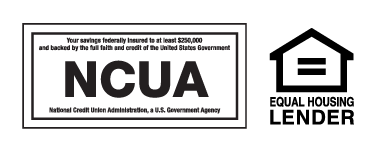Home Buyers Guide
If you’re in the market for a new home mortage, looking to refinance your current home, or want to access the equity in your home to make improvements, read these tips to make sure you have the knowledge you need to make informed decisions!
Live within your means
Buying a home is an exciting life event, and your home is likely your largest asset. However, when purchasing a new home, make sure that you are not spending your life savings. When you own a home, there are plenty of other expenses for which you need to account: utilities, home maintenance, home improvements, insurance and other costs. In addition to your home, you have other life costs. Remember: while your home can appreciate in value over time, your home is not a liquid asset - meaning it cannot easily be converted to cash. You can't decide to buy your home in the morning and sell it in the afternoon. Keep this in mind when you choose your loan amount and interest rate.
Consider the best loan options for your financial situation
When it comes to a new mortgage or refinancing your current mortgage, you have several options (among others) from which to choose. Choose the loan option that makes most sense for your personal financial situation. There is no universal rule for every homeowner. Everyone's financial profile is unique. That means that your financial situation is specific to you.
For example, a married couple with children may prefer a 30-year fixed mortgage because they expect to be in the same home for the long-term, and want the peace of mind to pay the same interest rate (regardless of interest rate changes).
A newlywed couple without children may prefer a shorter-term, adjustable-rate mortgage - which initially has a lower, fixed interest rate - because they expect to sell their home (and buy a larger one to make room for their children) before the interest rate converts to a variable interest rate.
Make sure your credit report is accurate
When you apply to borrow or refinance a mortgage, expect that your credit report will be checked. Your lender will review, among other factors, your financial history, income and other debt obligations. If you have a lower credit score or poor financial track record, you can expect to pay a higher interest rate on your mortgage because lenders view you as a riskier borrower. Check out the credit score “Dos and Don'ts” below for more information.
Credit Score Dos and Don’ts During the Lending Process
Did you know that your credit report is pulled twice during the lending process? Once in the beginning during the pre-approval stage and again right before your closing. During this time period it is imperative that you don’t do anything that could impact your credit score or your loan. Here’s what to do to protect your credit while you are in the process of purchasing or refinancing a home.
Don’t Apply For New Credit and Don’t Close Any Credit Card Accounts Seems like a good idea to close those old credit cards, right? Don’t! Well, at least not when you’re in the process of securing a loan. Closing credit cards can hurt your debt-to-credit utilization ratio, which is the debt you have incurred on your credit cards divided by the credit limit on all your accounts. This ratio makes up 30% of your credit score. Closing credit card accounts will not only lower your available credit, but will also reduce the average length of your credit history. These both factor into what mortgages and interest rates you qualify for.
Do Continue to Use Your Credit Cards Continue to use your credit cards and make your monthly payments as you normally would. If you stop using your credit cards for an extended period of time, your card issuer may cancel your card. This affects the average length of your credit history, resulting in a lower credit score. Lenders like to see a healthy credit history of using and paying your credit card bills on time
Don’t Make Big Purchases Using Credit When purchasing a new home, you may be eager to buy new items to furnish your home. Wait until after your closing to make these big purchases! This new debt can change your qualifications for certain mortgages and interest rates. Lenders recommend that your credit card balances be 30% below their limit during the loan process.
Don’t Co-Sign On a Loan Think twice before co-signing on a loan for any relative or friend. Co-signing on a loan is an added risk to your credit score. Although you are not the primary borrower, by co-signing you are responsible if the primary borrower defaults on the loan. This added risk will alter your debt-to-income ratio, which will also affect your credit score.
Do Call Your Mortgage Loan Officer Your mortgage loan officer is there to guide you through the lending process. If at any point during the process you have questions, don't hesitate to reach out.
Remember, you can count on your Ccredit Union for a consumer-friendly Mortgage Loan.
Very LOW Closing Costs
No Origination Fee
And we close most loans in about 30 days.
Ready to take the next step? Contact us to request more information and get started with your home loan today!
Home Loan Requestsources: Linda Ferrari, National Credit Expert, Author of The Big Score- Getting it and Keeping it; Kendall Taylor, LendUS, Forbes Magazine 2017; Zack Friedman, contributor.


